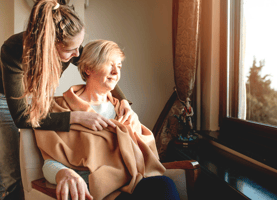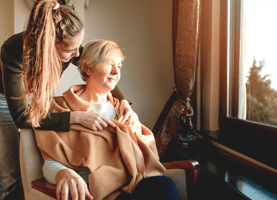Understanding the Needs of Dementia and Alzheimer’s Patients Challenges Faced by Patients...
What to do if you get diagnosed with Alzheimer’s Disease or Dementia
Finding Your Way: A Compassionate Guide for New Dementia Diagnoses
One receives a diagnosis of dementia, and suddenly one feels like a fork in the road is right around the corner, only without a map. That diagnosis can bring a whirlwind of emotion, concern, and questions about tomorrow. Whether you are going to embark on this journey or a loved one is, remember: You are not alone. This guide is here to hold your hand, and it does so with compassionate, practical advice and guidance.
Step 1: Processing Emotions
First of all, allow yourself to feel. Being diagnosed with dementia can bring all kinds of emotions to one’s mind: shock and disbelief, anger, sadness, and fear. These are all okay. Do consider the help of a mental health professional to guide you through understanding and coping with those emotions. It also in a way helps to bring a community together and understand someone else in the same shoes.
Step 2: Get Educated About Dementia
Empower yourself with knowledge. Dementia is, in fact, the syndrome of several diseases of the brain that all lead to loss of brain function. Memory, thinking, behavior, and the ability to carry out everyday activities are some of the mental abilities that patients with this kind of disorder lose.
Step3: Advance Planning
It may sound like a very daunting task, but planning ahead will make you and your loved ones stronger. It will entail:
Legal and Financial Planning: Talk to an attorney about how to set up wills, living trusts, power of attorney, and advance healthcare directives. Financial planning can be applied to assure that in case of a loved one or yourself, the wishes will be met without putting the family under additional financial strain.
Health Planning
Talk with health professionals about the progression of the illness and what may be expected for it. This can include medication management, therapies, and possible future care needs.
Step 4: Build Your Care Team
The difference your supportive care team can make. This team can range from immediate and extended family members, friends, healthcare providers, to professional caregivers. All the members of the team have something unique to contribute: from emotional support to help with daily tasks. Always remember that it is okay to reach out to others for help. This help can bring some kind of relief, comfort, and support.
Step 5: Adapt Your Living Environment
It is paramount that the living environment be conducive to safety and comfort. Consider making changes around the home that can lower those risks, such as the installation of grab bars in the bathroom, getting rid of trip hazards, and ensuring that there is enough lighting.
Step 6: Well-Being
There will be other physiological and emotional needs of the person living with dementia and carers. These will include:
- Healthy living: Through proper nutrition, physical activity, and sleeping, symptoms can be managed, hence enhancing the quality of life.
- Stay Socially Engaged: Social engagement helps a person remain connected and maintains happiness. A person may also do something; perhaps his or her favorite activity or pastime, and can be done with someone who shares the same interests.
- Keep Mentally Active: Reading, puzzles, and listening to music among other activities could be of help.
Step 7: Consult Others
You do not have to go through it alone. Support is offered in various forms, such as:
- Support Groups: There is relief in sharing with those who have similar challenges and through that one can get comfort, practical advice, and a sense of community.
- Professional Caregivers: Family caregivers require respite in the forms of home care services or adult day care centres to offer opportunities for socialization by those with dementia.
In some instances, resources may comprise educational information and local support services in areas of the Alzheimer’s Association.
Step 8: Take Care of You
Being a carer of someone living with dementia is both rewarding and quite demanding at the same time. In fact, caregiver burnout is a reality, and care has to be taken of the health and well-being of a caregiver. This means, one also needs to allow time for rest, hobbies, and social activities, which rejuvenate you. Well, after all, taking care of yourself is not selfish; it is rather very much a necessity.
Conclusion
Diagnosis is not the end of the story but just the beginning of a new chapter. Struggle and challenge ahead, yes, but joy, love, and connectedness also. To face this journey with grace and resilience, become knowledgeable, prepare ahead, and seek support. You don’t need to face this alone. There is a community ready to walk alongside you, offering support, understanding, and hope for the road ahead.


